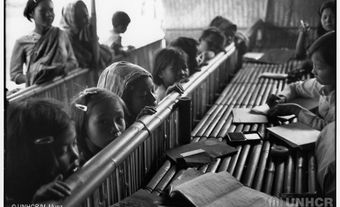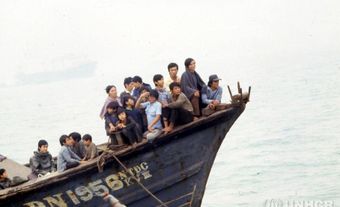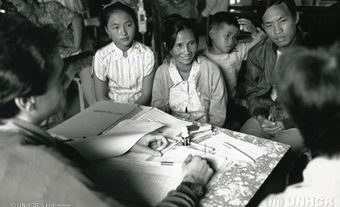Ethnic Studies
Ethnic studies are concerned with the study of groups who share a sense of peoplehood, based on a belief in a common origin, culture or physical traits. These studies embrace a wide range of disciplines, eg, history, SOCIOLOGY, ANTHROPOLOGY, other SOCIAL SCIENCES, EDUCATION and the humanities. The development of ethnic studies has greatly influenced Canadian society, government policy and the various academic disciplines.
While Canadian society has always been ethnically heterogeneous, the interest in ethnic studies began in the 1920s. The concept of the cultural "mosaic" was later criticized by John PORTER as being a stratified or VERTICAL MOSAIC. The emergence of the concept of cultural pluralism, or MULTICULTURALISM, in the 1960s and 1970s was sparked by the "ethnic revival" in the US, the expansion of the social sciences in Canadian universities, the increased influence of other non-charter ethnic scholars, and the Royal Commission on BILINGUALISM AND BICULTURALISM.
In the 1970s the federal government proclaimed a policy of multiculturalism within a bilingual framework, a new Citizenship Act and a new Immigration Act (see CITIZENSHIP). Several provinces also proclaimed policies of multiculturalism. Since 1972, a number of federal programs have initiated or encouraged ethnic studies. Provincial departments of education have increased opportunities to study not only mother tongues and cultural origins, but also ethnic diversity as a dimension of Canadian society. (See LANGUAGE and ETHNIC LANGUAGES.)
Research and publication in the area of ethnic studies have burgeoned, especially since the 1960s, with the formation of the Canadian Ethnic Studies Association and the founding of the Canadian Ethnic Studies Journal. In the beginning, most of the proceedings of the association's national conferences were centred on the power relations between the two founding British and French charter groups and their concerns about maintaining their official languages. During the QUIET REVOLUTION, the Québécois were increasingly concerned with maintaining their FRENCH LANGUAGE and culture in a Québec "nation." This momentum in the 1960s also encouraged other ethnic minorities to increasingly focus on their identities and how to maintain them (see ETHNIC IDENTITY). Thus, numerous books were published that focused on ethnic identities and the fusion of the needs of the European charter groups and entrance-groups. More than 20 histories of Canadian minorities were published in one Ethnic Heritage series in the 1970s and 1980s, including books on the Arabs, Greeks, Japanese, Portuguese, Scottish, Ukrainians and Chinese, documenting their heritage and changing communities.
Prior to 1970, 95% of the Canadian population was of white European origin and most of the new immigrants were also from Europe. With the changes in Canadian IMMIGRATION POLICY in the late 1960s, new immigrants increasingly came from non-European countries, so that by the 1990s most of the top 10 immigrant donor countries were Asian, and only one or two were European. In the span of 20 years between 1971 and 1991, the proportion of non-European visible minorities increased from 5 to 10%, with the result that from the 1980s onwards more research and publication have focused on race, RACISM and visible minorities. Texts used in university classes now deal more broadly with concerns of identity as well as race and racism, the major concerns of whites and visible minorities respectively.
See alsoPREJUDICE AND DISCRIMINATION; ETHNIC AND RACE RELATIONS.

 Share on Facebook
Share on Facebook Share on X
Share on X Share by Email
Share by Email Share on Google Classroom
Share on Google Classroom


